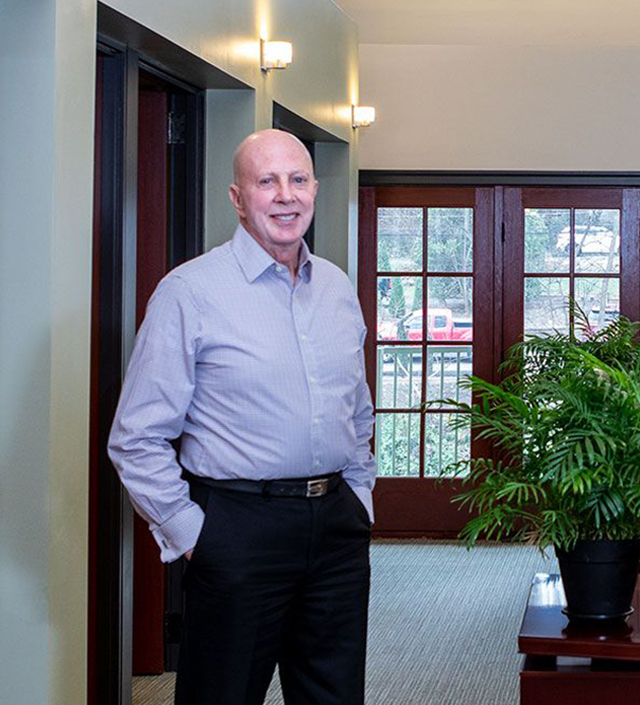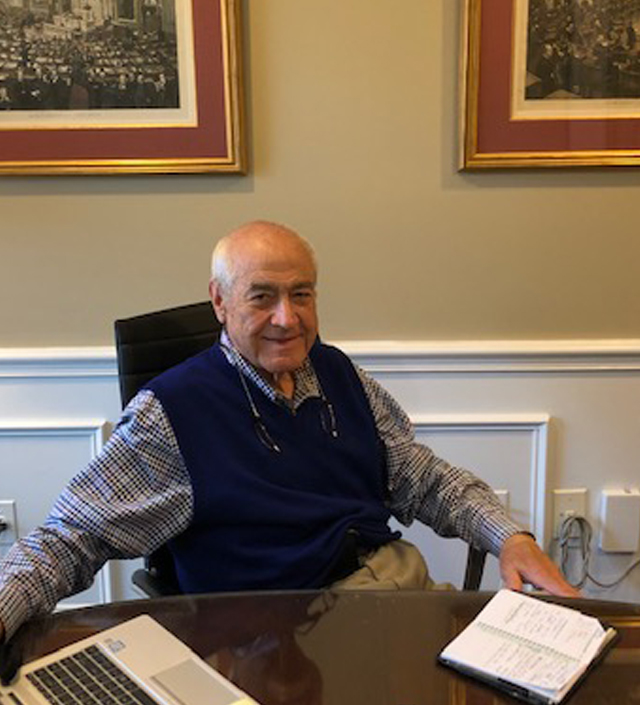Editor’s Note: This article is part of a series Rethinking65 is doing on older advisors who are continuing to work. You may also be interested in reading our articles on Don Rembert and Dick Wendin (both 82) and 74-year-old June Schroeder. Want to suggest an advisor for the series? Contact Editorial Director Jerilyn Klein.
Aerospace engineer, power yoga master, high-performance racetrack-driving instructor and financial advisor are roles that are rarely, if ever, discussed in the same conversation. Unless you’re speaking with 73-year-old Robert “Bob” Connell.
Connell, founder and CEO of Apex Financial Advisors, an SEC-registered investment advisory firm based in Yardley, Pa., has tried his hand at all of them at some point and has spent 47 years in the financial services industry.
At this point, “I’m working half time,” he says. “I only work 12 hours a day.”
A little while back, Connell took a longevity test in which he input his lifestyle and other variables. Based on that test, “I’m supposed to live till 98,” he says. “So I’ve only got, what, another 25 years to work.”
“I’m supposed to live till 98. So I’ve only got, what, another 25 years to work.”
Connell didn’t initially plan to work in finance. Instead, he says he was steered toward engineering because he excelled at math. But it wasn’t the U.S. space program that motivated him to gravitate to the aerospace niche as a college student in the mid 1960s.
“I’ve always been attracted to money, so it was very simple,” he says, about selecting that specific engineering major. “I said, ‘Which pays the most?’ They said, ‘Aerospace engineer.’ I said, ‘Fine.’”
After graduating Penn State University in 1969 with a bachelor’s degree in aerospace engineering, he couldn’t find a job “because the aerospace industry tanked,” he says. So he stayed on two more years, working on a master’s degree and researching a NASA contract with Penn State. One project he worked on involved the top secret Mark 48 torpedo, he said. But the industry hadn’t improved, he says, so “I was really just filling time until I decided this wasn’t going to work.”
Connell’s next step was entering the executive training program of retailer John Wanamaker & Co. “because I had no idea what I wanted to do when I grew up,” he says. Then “I actually saw an ad in that newspaper that said, ‘Do you want to make more money?’ and I said, ‘Hell, yeah, I’m not making any now.'” He responded and got a job at Bache & Co., which eventually became Prudential-Bache Securities.
After some years, he told the firm he wanted to leave Philadelphia to open an office in the suburbs. “They basically made it prohibitive,” says Connell, so he moved on in 1980 to what was then Shearson Loeb Rhoades.
First he had to find a location, so he purchased a mom-and-pop restaurant in Newtown, Penn., “at the confluence of four major highways,” he says, and converted it into office space. (“From 1980 to 1990 and from 1990 to 2000, Newtown was the fastest-growing town in the state of Pennsylvania, so I was 100% correct.”)
“I hired a couple people and so we started the first national brokerage firm in Bucks County, Pennsylvania,” says Connell. That was the beginning of his 29-year run at Smith Barney, in some iteration.
“They must’ve changed the name a dozen times. I had a new sign every other year because Sandy Weill was constantly buying other firms,” he says.
Owning the building in Newtown is also what first got Connell interested in commercial real estate — a specialty at Apex Financial Advisors.
Between leaving Smith Barney (after Lehman Brothers went bankrupt) and founding Apex, Connell had a one-year stint at Merrill Lynch. “That didn’t go well,” he says.
Merrill Lynch accused him of improperly bringing client information from his previous firm. Although he explained that his clients had given him their tax returns and estate planning documents because he had always done their financial planning, he says, “Merrill Lynch walked me out the door, tried to get out of a contract and kept my team, and I took them to arbitration.” In the end, “I got a $4 million settlement, because the arbitration panel basically found completely in my favor,” he says.
Create Your Future
Connell opened Apex Financial Advisors in 2010, right after leaving Merrill Lynch, and says he hasn’t looked back. The RIA firm provides independent financial and investment advice for privately held businesses and high-net-worth families. The firm takes a multi-family office approach and also assists clients with tax planning strategies.
“I’m always a believer, ‘If you can’t find what you want, create it,’ so that’s what I do.”
“I’m always a believer, ‘If you can’t find what you want, create it,’” he says, “so that’s what I do.”
That hasn’t just applied to Connell’s career in the financial services industry, but also to his other endeavors.
For example, “I took a number of different yoga classes and I was unhappy with the classes I was taking, so I just created my own style and started teaching,” he says. “I combined Bikram and a number of other styles, so that it was a real flowing class for an hour and a half and everybody was sweating and leaving; it was not an easy class.”
Connell taught power yoga for 12 years, awaking at 4:30 a.m. to teach his 6:00 a.m. class three days a week. He also taught and certified approximately 50 instructors, he says. Although he still does yoga every morning, he’s no longer teaching. His reason: “I now have a three-year-old son, who’s taking a bit of time.”
Connell, whose wife is a psychiatric nurse practitioner who has her own practice, doesn’t have other children. “I started late,” he says.

Another pastime he has given up, as parenthood has taken precedence, is teaching high-performance driving. He had been an instructor on various racetracks throughout the Northeast for 20 years, he says. “I went to one [race] and it was fun, and then I just started doing more of them, and then I eventually became an instructor,” he says. But he never competed.
“I really didn’t enjoy the competitive race tracking,” says Connell, who did it for fun. “First of all, it would probably cost you $100,000 a year to competitively race drive, if not a half a million, depending on your level.”
Building a Practice
We hear a lot about advisors playing golf with clients and prospects. But Connell’s less traditional interests, as far as networking goes, have also helped him forge and strengthen connections. He has done some racetrack instruction with clients and some people he met in yoga eventually became clients, he says. One client recognized Connell many years after attending his yoga classes. “It’s a small world,” says Connell.
He’s been working with some of his clients for at least 35 to 40 years, and has also worked with clients’ children and even grandchildren.
Connell, who had bought and sold properties in Newtown over the years, really started using real estate as an investment for clients about five years ago. It was back in 2016 and he was unsatisfied with REITS. “The returns weren’t high enough, there were no tax advantages, the overhead was high,” he says. “I said, ‘I want to do direct investments because you cut out the middleman.’”
“So in 2016, we bought our first BJs,” he says, referring to the warehouse club retailer. “We paid $15,600,000, and we’re just selling it now for $21,600,000, which is five years later, at a $6 million profit.” Apex says the sale closed on April 30.
Apex Financial Advisors had put together partnerships for its clients to own the BJs facility, which was about 110,000 square feet, says Connell. “We manage now about a million square feet of space,” he adds. Its other properties are what he describes as “substantial office buildings” with large corporate tenants.
During the pandemic, suburban properties “have been way less impacted as opposed to the city office properties,” he says. In addition, a number of the tenants in the buildings Apex owns are healthcare companies that have done well during the pandemic, he says. (Connell once owned a big cruise ship used to take people on dinner cruises around Philadelphia, he says).
When it comes to the future and his own healthcare, Connell is optimistic. He confesses the longevity test he took wasn’t a qualified test. However, “I’m in perfect health; I take no medications; blood pressure is 115 over 70,” he says. “I’m very blessed. I missed two days of work in the last 40 years.”
Was he playing hooky or sick? “I actually got pneumonia both times,” he says, “but got on antibiotics and was back at work the next day.”
We wish him continued good health and hope he’ll still be serving his clients — and still doing yoga — in 2046.
Jerilyn Klein is editorial director of Rethinking65.







